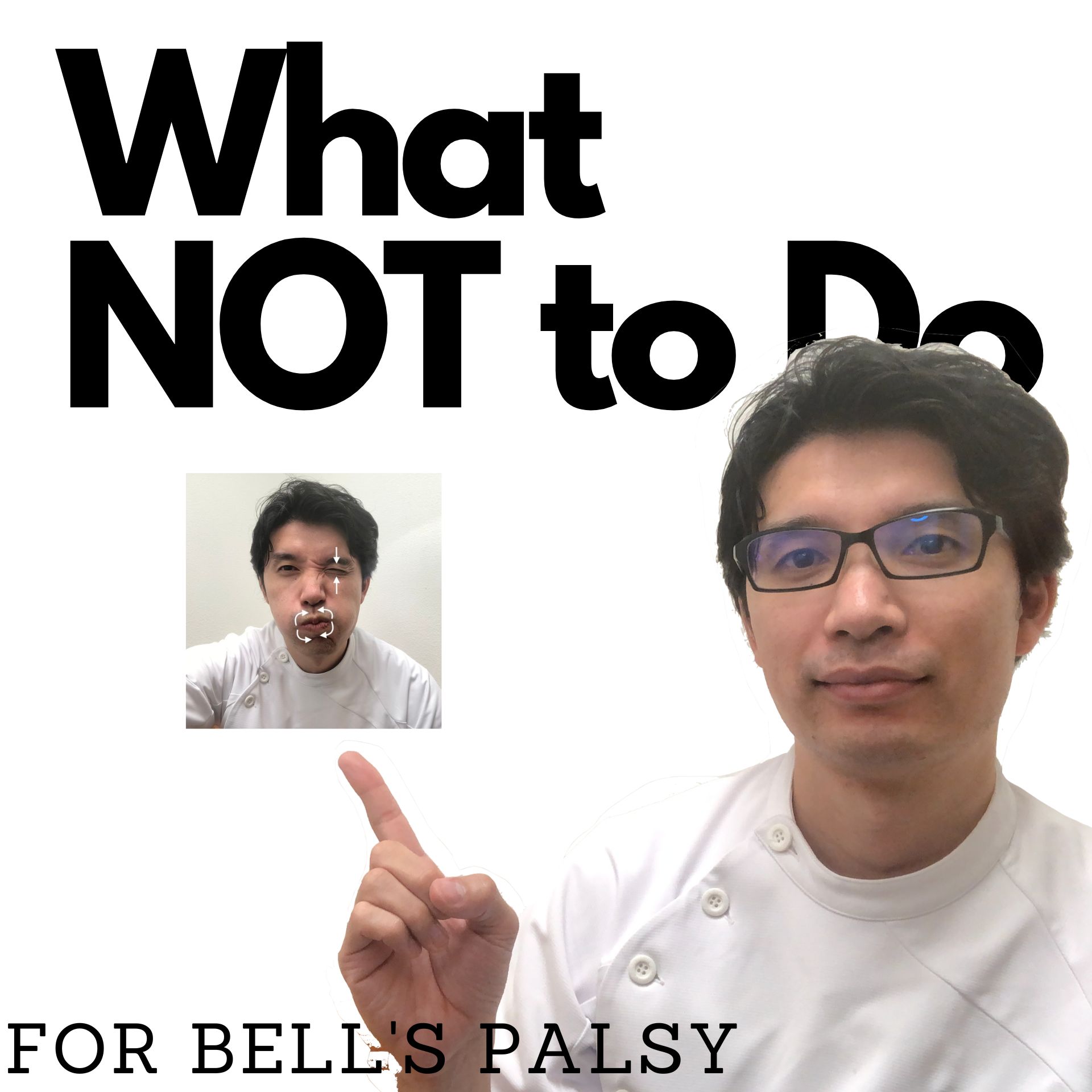Top 10 Questions About Neuropathy: Numbness & Tingling
Having a basic understanding of your condition can also be helpful. In this blog, I'll answer the TOP 10 questions my patients usually ask me about neuropathy.

July 22, 2024
In this blog, I want to share with you about Acute Bell’s Palsy and what you should avoid doing if you have it. I have noticed that some actions could worsen it or cause other complications. So, let’s go over what you should avoid for a smoother recovery.
Experiencing sudden paralysis in half of your face can be pretty frightening. I suggest checking out my blog post, “What To Do When You Get Bell’s Palsy: Simple Advice”. This post outlines five simple steps to help speed up the healing process for facial paralysis.
We understand this can be a lot of information and overwhelming: if you are looking for more support and answers, set up a free consultation with our Bell’s Palsy Specialist, Satoru Ozawa. Share your story, get your questions answered, and learn how you can set yourself up for tremendous success in achieving a healthy life.
M - F: 8am - 6pm Sat & Sun: 10am-3pm

Before discussing what not to do, I would like to touch upon Bell’s palsy briefly.
Bell’s Palsy is a medical condition that impacts the 7th cranial nerve, which is also called the facial nerve. The nerve experiences inflammation and swelling, which interrupts the signal to the facial muscles, leading to paralysis. This can result in a drooping mouth, inability to close your eye, raise your eyebrow, make a frown face, smile, and more. The cause of Bell’s Palsy remains unknown, but it’s frequently linked to viral infections, including herpes simplex.
It’s good to know that Bell’s Palsy is usually a temporary condition, but some people may need a little more time to fully recover than others.
According to studies, about half of the people who experience this condition recover fully in a short amount of time. And, around 35% of those affected report feeling better within a year or less, which is great news. However, a small percentage of roughly 15% may experience long-term effects from the condition.
It is common for approximately 85% of individuals who develop Bell’s Palsy to regain normal or near-normal facial function.
However, it’s important to note that a group of 15% may need stronger treatment options.
Typically, the disorder lasts for 7 to 10 days and starts with sudden facial weakness. Fortunately, most patients start recovering within 3 weeks, and around 85% of them will fully recover within 6 months. However, between 4 and 6% of the patients may experience severe facial muscle deformity that may not return to normal. Also, around 10 to 15% of the patients may experience asymmetrical facial movements that can be bothersome, either on the same or opposite side of the face.
Source: Bell’s Palsy Natural Treatments and Cures by Johnathan Porter

Although not scientifically proven, as a licensed acupuncturist, I would like to discuss the concept of Bell’s Palsy from an Oriental Medicine perspective. The ancient Chinese medical texts “Huang Di Nei-jing Su Wen & Ling Shu” describe this condition, which has been around for over 2000 years. According to these texts, Bell’s Palsy is caused by the elements of “Wind” and “Cold,” similar to cold symptoms.
In my experience, I have noticed a pattern where some patients develop Bell’s Palsy immediately after visiting a windy beach or attending an outside sporting event. Upon returning from their trip, they may experience some discomfort or unusual sensations in their face, ear, or head on the back of the ear, and the following day, they may develop Bell’s Palsy.
For these reasons, I suggest avoiding exposure to cold and windy environments if you are not feeling good. It’s essential to take caution not only in the winter but also in the summer due to air conditioning and fans. While modern technology provides us with comfortable living, it can also pose a risk of contracting unpleasant illnesses like Bell’s Palsy.

I totally understand how tough it can be to deal with Bell’s Palsy. It can be really overwhelming and frustrating. But it’s important to know what’s really going on. Bell’s Palsy isn’t a muscle issue. It’s a nerve issue. Just because you can’t move your facial muscles doesn’t mean they’re weak. Most likely, the facial nerve has been damaged and inflamed and needs time to heal before you can start exercising your facial muscles again.
Rushing into facial exercises too soon can actually cause Synkinesis, which is when your facial muscles move involuntarily. This can become a bad habit, like closing your eye when you puff your cheeks. That’s why it’s super important to focus on healing the nerve first and foremost.
Before attempting any facial exercises, it is important to consult with a specialist to ensure proper technique and safety.

It’s not entirely clear what causes Bell’s Palsy, but one possible culprit is a viral infection that can take hold when your immune system is weakened. Getting enough rest and sleep is crucial to keeping your immune system strong and helping you recover from the condition. In fact, good sleep is important for overall health, not just for Bell’s Palsy. If you’re having trouble sleeping, it’s recommended that you try to make some lifestyle changes to improve your habits.
When you consume excessive amounts of alcohol or caffeine, it can lead to insomnia. Reducing your intake of these substances and prioritizing your current condition, Bell’s Palsy would be beneficial.
Before attempting to treat your Bell’s palsy, it is crucial that you receive a diagnosis from a qualified healthcare professional. This is because other conditions, such as stroke or Ramsey Hunt syndrome, may present similar symptoms, and misdiagnosis could have life-threatening consequences. Once you have been properly diagnosed with Bell’s palsy, you can assess the severity of your condition with the Yanagihara Facial Paralysis scale (You can also read a blog “How to Scale Your Bell’s Palsy”) and decide on an appropriate treatment plan. If progress is slow, you may want to consider alternative treatments such as acupuncture, which has been shown to be beneficial for many Bell’s palsy patients.
We'll be happy to answer your questions.
Yes. During your first acupuncture session, we evaluated your Bell’s Palsy and muscle tightness. If you’re having trouble moving your face or experiencing discomfort in your neck, we offer effective treatments that aim to reduce inflammation and swelling while restoring movement.
To achieve a successful recovery from Bell’s Palsy, we suggest using a combination of Chinese herbs in conjunction with regular acupuncture sessions. It’s important to note that a weak and deficient immune system can contribute to the development of this condition. Maintaining a strong and healthy defense mechanism can significantly reduce your chances of being affected by Bell’s Palsy. That’s why we place great importance on living a healthy lifestyle.
It is generally recommended to seek treatment for Bell’s Palsy as soon as possible for a better prognosis. Delayed treatment, often months or years after onset, can result in more complex and prolonged cases with no guarantee of full recovery.
The frequency of acupuncture treatment depends on a few factors, such as your age and how severe your condition is. If you recently started experiencing something like Bell’s Palsy, you might need to go in for 2-3 treatments each week to get the best results. On the other hand, if you have a more long-term condition, you might only need to go once a week.
If you or someone you know has been diagnosed with Bell’s Palsy and would like to explore Acupuncture as a potential treatment option, please reach out to us by sending a message through our contact page. Thank you for taking the time to read this blog post! I appreciate your interest and hope to see you again for future posts.
We understand this can be a lot of information and overwhelming: if you are looking for more support and answers, set up a free consultation with our Bell’s Palsy Specialist, Satoru Ozawa. Share your story, get your questions answered, and learn how you can set yourself up for tremendous success in achieving a healthy life.
The following blogs discuss natural remedies, acupuncture, Chinese medicine, Chinese herbs, and tips for maintaining good health.
Having a basic understanding of your condition can also be helpful. In this blog, I'll answer the TOP 10 questions my patients usually ask me about neuropathy.
Neuropathy is a condition that occurs when peripheral nerves are damaged. This is Jeff's successful story of acupuncture treatment.
There are 4 steps that you can do by yourself to reduce the tingling, prickling, burning and numbness and increase the sensation of your feet.

Satoru Ozawa
hariQ acupuncture & herbs
Licensed acupuncturist, Certified Athletic Trainer and Chinese herbal specialist. With his 10 years of experience in Oriental Medicine, he will recommend the best natural Remedies, including Acupuncture, Chinese herbs, and health tips to relieve your suffering.
3 comments